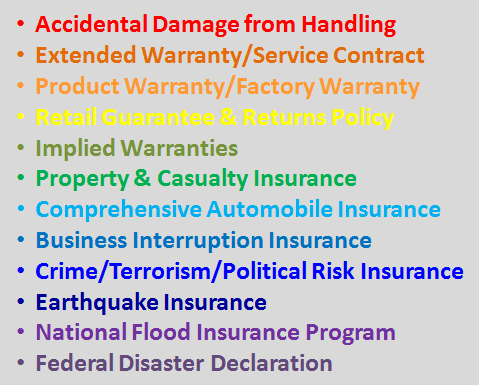September 1, 2011 |

|
ISSN 1550-9214 |
Warranties During Disasters:While warranties cover defects and insurance covers damage, there is quite a bit of overlap between the two. And in the past month, disasters and disturbances have made people aware that it really can happen to them.When it comes to risks and perils to property, there is a spectrum of coverages that includes both insurance and warranty, with many shades in between. Warranties don't cover disasters, but in their aftermath there's frequently an overlap between insurance and warranty. Talk about perils! Your editor, while visiting London last month, witnessed the sights and sounds of riots and looting on the streets outside. Days after returning to New York, the office walls shook profusely under the effects of a rare earthquake centered in Virginia. Then last weekend, a hurricane hit the East Coast of the U.S., tearing up the landscape from North Carolina to Vermont. All three left extensive trails of damage, injuries, and fatalities. Now comes the cleanup. What follows is an overview of some of the repair/replacement coverages that are likely to be accessed by those suffering losses last month, arranged loosely in a spectrum that ranges from the most routine to the most catastrophic. Blurring the LinesFirst, let's begin by saying that there is a clear separation between warranty and insurance. Warranty covers defects while insurance covers damage. But sometimes the line between them gets a bit blurry. For instance, extended warranties now sometimes cover perils such as drops or spills that have no clear relationship to a manufacturing defect. Some of the same insurance companies backing extended warranties and vehicle service contracts also write homeowner's insurance policies and comprehensive auto insurance policies. Some vehicle service contracts are routinely bundled with GAP coverage, which insures the owner for the difference between a car's value and the amount left on the loan should there be a total loss. Others are bundled with roadside assistance packages, tire puncture/repair services, or motoring clubs that will answer distress calls from drivers who locked themselves out of their cars. Whether it's warranty or insurance, there is a spectrum of coverage that begins with the routine and predictable risk of product failure and ends with a federal declaration that a major disaster has occurred. In between are a myriad of warranty and insurance coverages that we can only begin to summarize here. They include:  Warranty Week is by its very name about the warranty end of this spectrum. So let's start there. You buy a product. It doesn't work. Usually, you make a claim under a product warranty policy, or perhaps under a separately-purchased extended warranty policy. But sometimes, the merchant also has a guarantee or returns policy that allows for refunds or exchanges for numerous reasons, including defects or failures. Other times, non-warranted products such as clothing or food are covered by an implied warranty of merchantability, which would cover everything from missing pockets to sour milk. But sometimes, a retailer's "100% satisfaction guarantee" is invoked when buyers don't like the color or taste of a perfectly good product. Anything can have a warranty. Puppies can be sold with warranties that they are healthy. Mortgage loans can be sold with warranties and representations that they are not in default. Even the weather can be warranted, in the sense that discounts or damages can be offered if an event is interrupted by storms. After the record-setting 2005 hurricane season, for instance, some meetings and conventions in Florida sought coverage in case the weather turned dangerous and the gathering was cancelled. It didn't guarantee good weather, but it promised a payout if a storm struck. Accidental DamageBut let's start with something more conventional, like a laptop computer. Your editor once got a call from a homeowner in Alabama who left their laptop on the coffee table in the living room during a hurricane. The tide came in, she retreated to an upstairs room, and the storm surge inundated the ground floor, destroying the laptop. Was that covered by their Circuit City extended warranty? After all, it was accidentally damaged. There is such a thing as an extended warranty with additional coverages for accidental damage from handling. The key word in that phrase, however, is handling. And the missing word is normal. ADH covers accidents from normal handling -- damage that arises from the normal use of the product as intended by the manufacturer. If the laptop is dropped from a desk, or if its owner spills a grande caffè mocha into the keyboard, ADH covers that. But if they run it over while backing the car out of the driveway, or if they use it to knock down a wasp's nest from under the eaves, that's careless, reckless, abusive, or willful damage not covered by ADH. Water Damage IndicatorIn the case of water damage, and particularly with mobile phone insurance, there is a massive gray area caused by hot weather. The humidity in the air could be bad enough to cause a failure. And the mere perspiration of a customer could be enough to trigger a liquid contact indicator inside the unit. Apple Inc., in fact, routinely denies warranty claims on iPhones when the indicator inside it signals exposure to moisture. Some customers have filed suit, asserting that the moisture indicators themselves are defective. But all are faced with the daunting task of proving a negative: that they didn't negligently expose their handset to water. But we're not lawyers. Whether these types of failures should invalidate a claim is something we'll leave to the attorneys who craft the terms and conditions of those product warranty and extended warranty policies. What we are fairly certain of is that a failure caused by rising water during a storm will not be covered by a warranty, an extended warranty, or an ADH policy. Whether or not it will be covered by insurance is a function of the policy and the location of the loss. But again, we're a warranty publication, so let's leave that discussion to the insurance industry's lawyers. Electrical Surge ProtectionAn extended warranty usually provides longer coverage than a product warranty. But sometimes it also provides deeper coverage as well. For instance, the factory warranty included with many electronic devices typically excludes failures caused by lightning strikes, power surges, and blackouts. Again, it's not a defect of the product. It's an accident caused by an external source. Such a loss could be covered by an extended warranty. If it is, there would be a clause in the terms and conditions that explains the coverage. Sometimes, it requires that a surge protector also be in use -- in other words the protector failed to protect. Other times, there could be an overlap in coverage between the service contract and the homeowner's insurance policy. In those cases, sometimes the extended warranty will pay the deductible if the rest of the loss is covered by insurance. An extended warranty also could provide for the replacement of food spoiled during the failure of a refrigerator, for whatever reason. Other times, the spoilage would be covered only if it's caused by an internal defect, rather than by an external source such as a power failure. It all depends on the terms and conditions of the policy. A home warranty wouldn't ordinarily cover the damage caused by a disaster such as a flood. But it could be used as a convenient way to find a plumber or electrician able to repair or replace appliances at the owner's expense. Most of the servicers contracted by the home warranty administrators are more than willing to take on out-of-warranty work. And of course, any replacement appliances or heating/cooling systems would be covered by a new product warranty, issued by the manufacturer. And the seller might also offer an extended warranty for the new appliances or heating/cooling system. Repairing DefectsThe product warranty, also called the manufacturer's warranty or the factory warranty, is the written guarantee given to the first buyer. Yes, sometimes it's transferable to a subsequent buyer and sometimes with items such as car batteries it's issued by the retailer or dealer rather than by the manufacturer. Some retailers offer longer warranties on electronics and absorb the cost themselves. Others use their "satisfaction guarantee" policies as a proxy for longer warranties. But no matter how a warranty is defined, its coverage is usually restricted to just the repair of a defect or the replacement of a clunker. Where warranty comes into play with disasters is mainly in the area of fraud. First, there is fraud regarding the cause of a failure. "The screen wasn't cracked by an earthquake. I don't know how it happened." Claims adjudicators will have to ask themselves whether they want the customer's continuing goodwill, or if they should stick to the terms and conditions. Everyone's heard the legend of the Neiman Marcus manager who took back tires he didn't sell, simply to keep a loyal customer happy. But goodwill gets expensive, especially after a disaster strikes. Second, there are attempts to cover-up the damage, such as when a car is flooded, written-off, salvaged, retitled, and resold in another state as "barely used but never damaged." It happened along the Gulf Coast during Hurricane Katrina in 2005, and it's sure to happen again now along the East Coast after Hurricane Irene. In fact, while alert dealers and buyers were on the lookout six years ago for retitled wrecks from Louisiana, Mississippi and Alabama, they may not be so suspicious this time if the vehicle was titled in the Catskill Mountains or Vermont. Beware of bargains, and beware of sellers who won't allow a buyer's mechanic to look under the hood. Beware the Storm-ChasersAnd third, there are the so-called storm chasers -- the contractors willing to repair a roof or a roadway for a low price, promising warranties that turn out to be worthless. Some may require 100% payment up-front for a job they never intend to start, let alone finish. Some may just take a down payment for the work, or to buy the materials, and then they disappear. In the recent disasters, the repairs will involve everything from bridges and shopping malls to basements and artificial surfaces on soccer fields. Warranted building products such as carpets, windows, shingles, doors will be in high demand. And let's not forget that the Chinese drywall problem arose after hurricane repairs caused a shortage of domestic sheetrock. The customers promised warranties for those repairs will include municipalities, businesses and consumers. But even in good weather, we constantly hear about the driveway resurfacing scams or the home remodeling scams, where the contractor disappears or changes the name of their business to avoid later claims for their shoddy or incomplete work. The best advice we can offer is to know your contractor -- know where they live (ask to see their drivers license) and work (get their business card), know their reputation (search the Better Business Bureau), know that they have all the right insurance coverages (liability and worker compensation certificates) and that their warranties come in writing (ask to read them). And don't ever buy disaster recovery services from a door-to-door salesman who was "just passing by." Implied WarrantiesIn the absence of a written warranty, there still may be protections available to a victim of fraud. In the case of a used car, for instance, even an "as-is" sale by a dealer may be covered in certain states by an implied warranty of fitness for a particular use. That would mean it works, that it can start, move, stop, turn, climb a hill, and all the other things a car is supposed to do. And, in some states, that would also mean it wasn't flood-damaged. But the same protections might not apply to a private "as-is" sale of a used car, a boat, or an existing home. But this is where things get a bit tricky. A claim under an implied warranty is likely to take the form of a lawsuit. In fact, about the only time an implied warranty comes into play is in a case where there was no written warranty, such as with food, apparel, medicine, and services. Glass in your hamburger? That's a lawsuit. Water in your gasoline? That's a lawsuit. Sick from smoking? That's a lawsuit. And then there are the requirements to disclose. With cars, a dealer might be required to disclose that a vehicle is flood-damaged. But many times these salvaged vehicles are sold across state lines and title passes through multiple pairs of hands, some of whom may not know (or want to know) the vehicle's history. With homes, the seller might be required to disclose flood damage, mold problems, asbestos, radon, mercury or other hazards. But the rules vary from state to state. And the rules for commercial property or multiple dwelling buildings may differ from the rules for single family homes or mobile homes. And here's where we cross over into insurance. Warranty covers defects. Insurance covers perils. No warranty would cover a stolen or mislaid laptop. Insurance might. No warranty would cover damage from a flood or an earthquake. Insurance might. No warranty would cover a car destroyed by arson or a falling tree. Insurance might. Property & Casualty InsuranceIn the broadest sense, what we're talking about here is property and casualty insurance. Some insurance companies place extended warranty underwriting under that heading. Others call that specialty insurance. We won't get bogged down in the definitions, however. After all, this isn't an insurance newsletter. With a boat, of course, high wind and rough water are well-known perils. And the hurricane last week didn't disappoint. According to the Boat Owners Association of the U.S., the total damage to recreational boats from South Carolina to Maine could total up to $500 million. And what's surprising is that most of the damage wasn't along the coast. It was in lakes and rivers. The association, which also sells insurance, said over a thousand of its policyholders took advantage of a policy feature that helps defray the cost to remove a boat from the water before a storm. And indeed, after the storm passed, it reported 500 boats removed in Oregon Inlet NC and only two wrecks, as opposed to only 50 removals in New Bedford MA and 15 wrecks. New boats typically have factory warranties and are eligible for service contracts as well. But neither would come into play here. A weather event such as this might expose defects in the on-board systems, but the proximate cause of the damage would be the wind and the water. Losses would have to be covered by insurance. The repairs and replacements, however, would receive their own warranties. With an automobile in the U.S., there are three major types of coverage. Liability insurance covers injuries and damage which a given driver causes. Collision covers damage to your own vehicle in an accident, no matter who's at fault. And comprehensive covers damage from weather, fire, theft, vandalism, and other perils. Service Contracts & GAP InsuranceWhen a car purchase is financed, the lender usually requires all three. The dealer sometimes suggests also adding in a vehicle service contract and perhaps GAP coverage, but these are not required. However, there have been instances when the buyer was wrongly told an extended warranty was a requirement of the loan, and its cost could be bundled into the loan payments. And one can see how easy it would be to position an extended warranty as part of that spectrum of coverage: it's comprehensive insurance for mechanical breakdowns. But still, extended warranties are not required by the bank, while comprehensive and collision coverage usually is. During the riots in London last month, cars were burned, windows were broken, and inventory was stolen. Comprehensive insurance might cover this, or it might not. It all depends upon the determination of the cause. If two people do it, it's vandalism. If 200 people do it, it's a rampage. If 20,000 people do it, it's a rebellion. And if two million people do it, it's a civil war. Property and casualty insurance policies and comprehensive automobile policies sometimes exclude damage or loss caused by war, rebellion or civil unrest. Other times, they allow claims caused by small local riots, but only if the damage is reported quickly. But a lot depends upon the definitions and exclusions included in the policy. And the law governing anarchy in the UK is not the same as the law in other countries. Acts of WarIn some instances, the damage might indeed be caused by an organized group -- one man's definition of looters, hooligans, or gangs might be another's definition for terrorists, extremists, or rebels. For instance, most people would call the September 11 attacks an act of war -- indeed, the response to it was branded as the War on Terror. But many insurance policies contain clauses that would specifically exclude such losses, if caused by war or military action. And so, for that reason, there are now separate policies sold that specifically cover acts of terrorism or acts of war. Some even cover the specific use of weapons of mass destruction. We hope the world never comes to that. But one would expect that many merchants in London will from now on look for insurance that specifically covers vandalism and looting. Also, insurance would not typically cover the cost of a simple loss of use, unless that were written into the policy. For instance, many businesses that were not damaged by the riots in London could not reopen for days, because of the cleanup. Others were open, but customers stayed away in fear. At one unscathed children's theater, for instance, there was a rash of cancellations on the nights after the riots ended. At one golf shop located far from the actual riots, the owner kept plywood over his windows and doors for nearly a full week, which cut into his business tremendously. Right now in the Northeast U.S., there are Main Streets all over that are extensively flood-damaged, and countless basements full of inventory that will never dry out. Some businesses are still closed. Others are open, but the customers aren't coming. For instance, some people won't eat at restaurants in areas that lost power during last week's hurricane, for fear they might be served spoiled food. These losses would have to be covered by some type of business interruption insurance. Replacement CostWith household appliances, assuming that perils such as floods and storms are covered by a homeowner's insurance policy, there's a further consideration of how well they're covered. Are they insured for their replacement cost? Or are they insured at their current, deeply depreciated value as a used item? That's going to impact the budget for new appliances significantly. However, most homeowner's policies specifically exclude losses caused by earthquakes, rising water, and wind storms. Or the policies might specifically cover such perils, for an additional premium and with additional deductibles. In the U.S., properties in locations defined to be flood-prone are eligible for the National Flood Insurance Program. But because flood losses are expected in these locations, the premium may be high. And therefore many people choose to go without. The same goes for earthquake insurance in California and Nevada, or hurricane insurance in Florida. Sure, people know they need it, based on the likelihood of a loss in such locations. But some can't afford to pay $100 a month or more in additional premiums, just for these coverages. So what happens if they go uninsured and lose everything? The Hundred-Year StormLast month, however, part of the tragedy was how unexpected the calamities were in those locations. The August 23 earthquake was the biggest to hit Virginia since 1897. Hurricane Irene was the first to make landfall in New Jersey since 1903. And the worst damage was in even more unexpected places. Flood damage to beachfront property is one thing. But Brattleboro, Vermont? And that's where the last step in our spectrum of coverages comes into play. When a major disaster strikes, people typically look to the government for help. And once the governor of a given state requests it, the federal government is able to make a formal disaster declaration that makes available a whole new set of assistance, loans, reimbursements and grants to individuals, households, and state and local governments. In extreme cases, the government will buy a home, demolish the damaged structure, and keep the land. The seller is then free to use the cash to move elsewhere. Just in August 2011, Major Disaster Declarations were made in New York, New Jersey, Utah, Missouri, Nebraska, Louisiana, Iowa, Puerto Rico, and North Carolina, for a list of perils that included flooding, tornadoes, severe storms and hurricanes. Vermont was added to the list earlier today. Expecting the UnexpectedAs with accidental damage from handling, the insurance companies are willing to cover the routine and normal perils: crashed cars, house fires, building collapses, etc. But when it comes to the rare and abnormal events, particularly weather-related disasters, they look to the insurer of last resort: the government. And that's now becoming a political issue. Should the uninsured be bailed out by the taxpayers? Or is there a moral hazard to helping the helpless in their hour of need? This discussion is far from over. Comments are welcome and will be added to the online edition of this newsletter. We're looking particularly for real-life examples of the interplay between warranty and insurance after a major disaster. Please send your comments to earnum(at)warrantyweek.com. | |||||||||||||||||||||||||||||||||||||||||||||||||||||||||||||||||||||||||||||||||||||||
| |||||||||||||||||||||||||||||||||||||||||||||||||||||||||||||||||||||||||||||||||||||||







